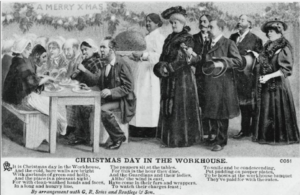Follow us on Facebook @FHofDW
A Not So Happy Christmas
Christmas in Victorian times focused on food and family just as it does today. The shop displays were, in some cases, more extravagant than they are today the butchers and poulterers were a sight to behold.
At the Barracks the men decorated the billets and food prepared for their table. Even in Eastry Union festive food was served up to the inmates. But what if you didn’t have charitable tickets for food or coal, what happens if you were turned down for such help so didn’t try again, what happened if you didn’t want to apply to the Relieving Officer in fear of being ‘sent to the workhouse’, what happened if you thought you could manage, just about? You simply went hungry and cold.
This is the story of one such case.
In mid 1885 the three adult children of Mary Minter were doing all they could to keep their elderly and ill mother out of the Workhouse.
For a while Mary and her widowed daughter, Eliza, had lived with her other daughter, Rebecca and her family in Sandwich which is where in Christmas 1884 Eliza applied to the Relieving Officer for some support for her mother. But her brother Henry was in employment and living they would not give her anything.
Life was a struggle in Sandwich so Eliza and Mary moved back to Deal, where Eliza eventually found work in one of the canning factories earning just 6d a day.
At first they stayed with a kind lady who let them share her two rooms rent free. But three adult women in two small rooms was far too cramped so, with the occasional help of Henry, they decided to move into their own rented rooms.
Having been turned down for relief in Sandwich Eliza did not try again in Deal, feeling she would get the same response and by Christmas of 1885 living on 6d a day, the money from belongings they had pawned, handouts from neighbours and the occasional 5s from Henry the women were surviving on bread and when they could afford it a bit of cooked meat. They had no spare money to purchase coal or wood to keep themselves warm or to even to make a hot drink. For some reason they were not even entitled to tickets for the Soup Kitchen that operated during the winter months.
On Christmas Eve Eliza called on a neighbour who, seeing her in such a poor state, gave her a shilling so perhaps for Christmas Day at least they had something to eat and maybe some fuel for a fire.
Then on March 12, 1886, Mary died. An inquest was held the next day and, based on the evidence given by Eliza, friends and neighbours and the Doctors Report the Coroner’s verdict was “…natural causes accelerated by want of proper food and exposure to the cold…” In other words she died of cold starvation.




